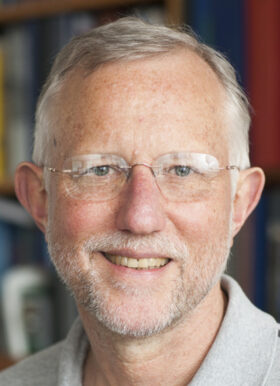
Charles Moen Rice III
Doctor of Science
One of the world’s most accomplished virologists, Charles M. Rice III, PhD, the Maurice R. and Corinne P. Greenberg Professor in Virology at The Rockefeller University, made seminal discoveries about the hepatitis C virus that helped transform infections with the virus from deadly to curable.
Tens of millions of people are infected with the hepatitis C virus, and about 20 percent of them will go on to develop life-threatening liver cancer or cirrhosis. Soon after the virus was discovered in 1989, Dr. Rice — then an assistant professor of molecular microbiology at Washington University School of Medicine and an expert in the related yellow fever virus — started working on a vaccine against the hepatitis C virus.
Developing a vaccine proved challenging — there is still none available today. But Dr. Rice’s decades-long study of the virus unveiled fundamental insights that have led to a treatment that cures 95 percent of infected people. A combination of antiviral drugs went on the market in 2013 and is credited with saving hundreds of thousands of lives.
The virus doesn’t grow under conventional laboratory culture methods, so one of Dr. Rice’s most important contributions involved finding a way to grow the virus in a dish. This breakthrough made it possible for him and other researchers to investigate how the virus infects liver cells, multiplies and causes disease.
Dr. Rice, who is head of Rockefeller University’s Laboratory of Virology and Infectious Disease, has focused on understanding how the hepatitis C virus replicates. The virus has a sloppy replication machinery that introduces mutations every time it copies the virus’ genome. This high mutation rate helps the virus avoid recognition by the immune system and also makes it difficult for researchers to target all strains at once.
Dr. Rice and colleagues produced a consensus strain of the virus with the most common genetic variants, tweaking the genetic sequence here and there to help the virus multiply faster. Then, they used this strain to find critical viral genes. The strain also serves as a model on which to test investigational drugs targeting those genes.
His work on the virus can be applied to other liver viruses, such as hepatitis B. He also studies viruses of global health concern, such as influenza A, dengue, yellow fever, Zika and chikungunya. Collectively, these pathogens are responsible for hundreds
of millions of infections and enormous human suffering every year.
After joining the Department of Molecular Microbiology at Washington University School of Medicine in 1986, he received the prestigious Pew Biomedical Scholars Award that year for young investigators of outstanding promise. He served as interim head of his department from 1993 to 1997 and was named professor in 1995. He became an adjunct professor in the department when he left Washington University in 2001 to join The Rockefeller University faculty and become the founding scientific and executive director of the Center for the Study of Hepatitis C, a position he still holds today.
The center was established by three neighboring New York City medical institutions — Rockefeller University, NewYork-Presbyterian Hospital and Weill Medical College of Cornell University — to enhance basic science and clinical hepatitis C research, with a goal of preventing and treating diseases caused by the virus.
Born in Sacramento, California, Dr. Rice earned a bachelor’s degree in zoology in 1974 at the University of California, Davis, and a doctoral degree in biochemistry in 1981 at the California Institute of Technology, where he remained as a postdoctoral research fellow.
Among his numerous scientific honors are the 2007 M.W. Beijerinck Virology Prize, the 2012 Dautrebande Prize from the Belgian Royal Academy of Medicine and the 2015 Robert Koch Award. In 2016, Dr. Rice and two colleagues received the Lasker-DeBakey Clinical Medical Research Award, the nation’s most distinguished honor for outstanding contributions to basic and clinical medical research.
He has served as president of the American Society for Virology and as editor of the Journal of Virology. He is a member of the National Academy of Sciences and a fellow of both the American Academy of Arts and Sciences and the American Association for the Advancement of Science.
Dr. Rice lives in New York with his partner, Margaret MacDonald, whom he met at Washington University where she was an MD-PhD student.